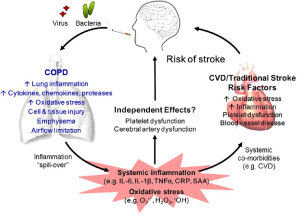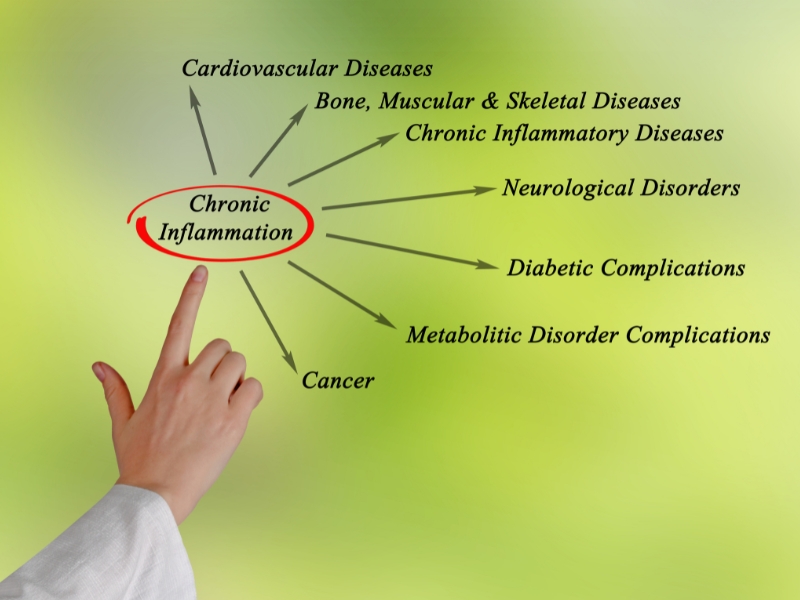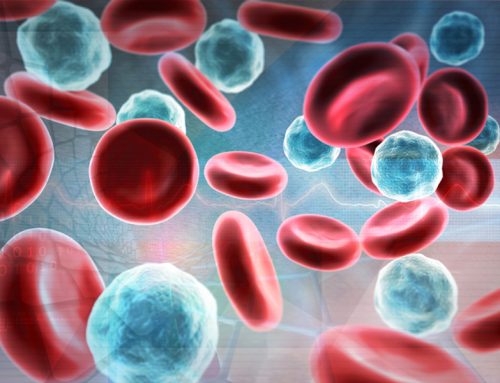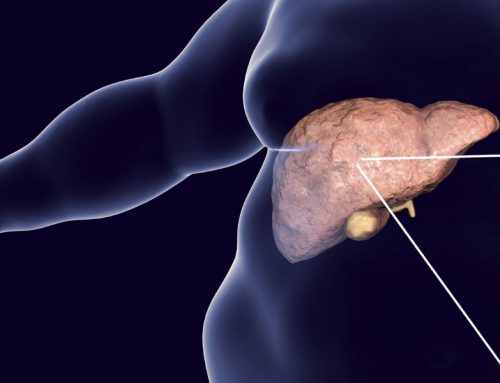
A 2017 meta-analysis of aggregated data from 17 clinical studies shows that Coenzyme Q10 supplementation is associated with reduced levels of bio-markers for systemic inflammation. Attribution: Austin, V., Crack, P. J., Bozinovski, S., Miller, A. A., & Vlahos, R. (2016). COPD and stroke: are systemic inflammation and oxidative stress the missing links? Clinical Science (London, England: 1979), 130(13), 1039-1050.
Coenzyme Q10 supplementation has a significant lowering-effect on bio-markers of low-grade systemic inflammation. This is the conclusion of a 2017 meta-analysis of 17 randomized controlled studies enrolling 811 study participants [Fan].
Inflammation is an immune system response to harmful stimuli. However, whenever the inflammation persists and becomes a chronic condition, and whenever the circulating levels of cytokines (= substances secreted by immune system cells) are elevated by a factor of two or more, then the inflammation itself can be harmful to the body in the long term.
In particular, chronic inflammation has been associated with increased risk of several degenerative diseases [Fan]:
- cancer
- chronic kidney disease
- heart disease
- type-2 diabetes
Coenzyme Q10 supplementation and bio-markers of inflammation
What are the bio-markers of inflammation that were investigated in the studies analyzed by Dr. Fan and his colleagues?
- C-reactive protein (CRP): Elevated levels indicate low-grade inflammation and increased risk of heart disease.
- interleukin-6 (IL-6): Elevated levels indicate infection or tissue damage and increased risk of heart disease and autoimmune diseases.
- tumor necrosis factor-α (TNF-α): Elevated levels indicate infection or injury and risk of increased insulin resistance and heart disease.
Daily dosages of Coenzyme Q10
Coenzyme Q10 supplementation in doses ranging from 150 to 500 milligrams per day was associated with statistically significant reductions in the circulating levels of CRP, Il-6, and TNF-α [Fan].
In the aggregated meta-analysis data, there is a trend towards greater lowering of inflammation levels with greater daily dosages of Coenzyme Q10 [Fan].
Treatment duration was not associated with any statistically significant differences in inflammation lowering effect [Fan].
Coenzyme Q10 supplementation and lipoprotein (a) levels
A 2016 meta-analysis of seven randomized controlled trials enrolling a total of 409 study participants has shown that daily Coenzyme Q10 supplementation significantly lowers plasma lipoprotein (a) concentrations [Sahebkar].
Research results have associated elevated blood levels of lipoprotein (a) with an increased risk of developing coronary heart disease or stroke [Sahebkar].
Moreover, lipoprotein (a) has been identified as a carrier of the oxidized phospholipids that serve to up-regulate the inflammatory process.
It is possible that Coenzyme Q10 supplementation reduces the level of systemic inflammation and reduces the risk of heart disease and stroke by reducing plasma lipoprotein (a) concentrations [Fan].
Effect of formulation of Coenzyme Q10 supplement
Dr. Fan and colleagues were not able to do a sub-analysis of the research data by the formulation of the Coenzyme Q10 supplements. It would be interesting to know which Coenzyme Q10 supplement formulations produced the greatest inflammation lowering effects.
In the context of Coenzyme Q10 absorption and clinical efficacy, formulation is undoubtedly mega-important.
If we want to work backwards from clinical study results to absorption to formulation, then we can look at the randomized, double-blind, controlled studies that have shown significant health benefits for users of Coenzyme Q10 supplements:
- Dr. Svend Aage Mortensen’s 2014 Q-Symbio study: 300 milligrams of Coenzyme Q10 per day, taken as 100 milligrams three times a day, resulted in improved symptoms and survival for chronic heart failure patients.
- Professor Urban Alehagen’s 2013 KiSel-10 study: 200 milligrams of Coenzyme Q10 in combination with 200 micrograms of high-selenium yeast daily significantly reduced the risk of death from heart disease in healthy elderly citizens in Sweden. Moreover, the combination supplementation significantly reduced the blood levels of C-reactive protein – a known bio-marker for elevated inflammation and for increased risk of heart disease.
- Professor Beatrice Golomb’s 2013 Gulf War Illness study: 100 milligrams of Coenzyme Q10 per day improved the physical function of veterans diagnosed with Gulf War Illness – quite possibly caused by exposure to the pesticides used around the US military camps in Iraq – and alleviated such symptoms as headaches, fatigue after exercise, muscle pain, irritability, and memory problems. Patients taking Coenzyme Q10 supplements showed improvement in 19 of the 20 symptoms studied.
Conclusion
Coenzyme Q10 is an essential bio-nutrient. Supplementation with Coenzyme Q10 is increasingly necessary as we get up in years. Our bodies synthesize less Coenzyme Q10 as we age. We cannot make up the difference in the foods we eat.
Coenzyme Q10 plays several vital roles in human health:
- cellular energy production
- antioxidant protection of cells, lipids, proteins, and DNA
- enhancement of endothelial function
- reduction of the extent of systemic inflammation
Sources
Fan, L., Feng, Y., Chen, G., Qin, L., Fu, C., & Chen, L. (2017). Effects of Coenzyme Q10 supplementation on inflammatory markers: A systematic review and meta-analysis of randomized controlled trials. Pharmacological Research, 119128-136. doi:10.1016/j.phrs.2017.01.032
Sahebkar, A., Simental-Mendía, L. E., Stefanutti, C., & Pirro, M. (2016). Supplementation with coenzyme Q10 reduces plasma lipoprotein(a) concentrations but not other lipid indices: A systematic review and meta-analysis. Pharmacological Research, 105198-209. doi:10.1016/j.phrs.2016.01.030
The information presented in this review article is not intended as medical advice and should not be used as such.








Leave A Comment